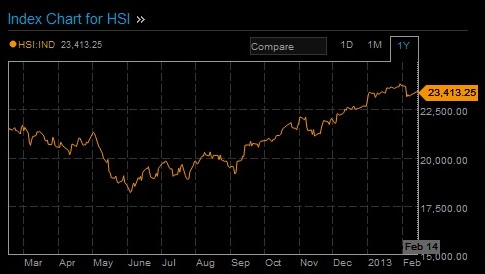
S-CHIPS MAKE up nearly a fifth of Singapore listcos.
But despite their troubled history of late, an influential New York accountant with a major firm says China shares listed in places like New York and Singapore may be due for a turnaround.
Mr. Drew Bernstein, Co‐Managing Partner of Marcum Bernstein & Pinchuk, has been working with Chinese companies for over 12 years, logging over 100 visits to the Middle Kingdom with stops in an equal number of metropolitan areas.
Last month he was quoted on ABC's "NightLine" news program on: "China Fraud Accusations" and recently drew leading Chinese executives to an SEC seminar.
And other than his stellar where’s-where travel history across the PRC, he also oversees four offices in Mainland China with 80-plus staffers.
Although his accounting firm mainly represents US-listed Chinese firms, Mr. Bernstein offered insights into how PRC companies selling shares in Singapore and Hong Kong might raise their profile and reputation among both shareholders and regulators.
NextInsight: How do Chinese firms listed in the US compare to non-Chinese firms listed there in terms of compliance with SEC regulations and/or the occurrence rate of auditing issues?
Overseas bourses clearly have singled out Chinese listcos in many ways.
But chances for Chinese firms are enormous, and I think most offshore-listed Chinese firms are trading at 30-40% of where they should be.
The current situation has come to involve a loss of trust in the whole system.

Accounting firms catch instances of fraud, but cannot prevent fraud.
That being said, we are upbeat on the potential of Chinese listed enterprises.
For all the challenges faced by Chinese companies, the country remains the fastest growing major economy in the world and investor sentiment can quickly move into a positive direction.
When this happens, management needs to be able to move quickly to take advantage of market windows and win investor confidence.
NextInsight: Are current travails among Chinese firms listed on the Nasdaq and NYSE comparable to the well-documented tribulations of S-chips?
In recent years, Chinese companies have been subject to vehement and often devastating attacks by short sellers, investigative media, and “independent” research firms.
Many such reports are supported by what appears to be voluminous evidence that can include Chinese regulatory filings, customer and employee interviews, and surveillance video and photography.
Such attacks will often trigger inquiries by the SEC (or similar market regulators in other countries) or may lead to suspension of trading in the company’s stock.
The drop in stock value often results in a parade of class action law suits.
As for S-chips in Singapore, I believe the core of the problem there is an issue of credibility.
Transparency and corporate governance are keys.
At the end of the day, the Singapore bourse is looking to enhance credibility.
Like any equity market, they take an attitude of: If you wanna play in our sandbox, you gotta play by our rules.
As an accountant, I would advise: Use known trusted professionals.

In order to maximize shareholder confidence and avoid negative scrutiny from capital market regulators, listed companies need to do these things to stay transparent and market-viable:
-- pay dividends
-- resolve shareholder lawsuits
-- build up cash
-- find strategic investors
NextInsight: What are the main reasons for the relatively high rate of auditing issues among Chinese-listed firms worldwide?
In 2008, the US capital markets fell significantly, and global firms have been hunting everywhere since for funds.
Fund managers saw what happened to Chinese firms in the US from 2008 on and raised the bar for market entry.
There is a shortage of qualified personnel in China with GAAP-accounting compliance which causes more problems.
In short, for listcos, CFOs are the last senior staff to be hired, and that says something.
NextInsight: What are the most common problems that offshore-listed Chinese firms are facing?
One of the most common non-compliance issues among China-based NYSE and Nasdaq-listed enterprises is a chronic problem with delay in SEC filings.
The main big problem is a lack of qualified staff within the Chinese firms.
As for the root of the problem I think a significant portion of the current travails plaguing PRC listcos at home and abroad involved growing pains.
When A-, S-, or H-share firms became too big for their britches, upper management often took a good look around and wanted to up the ante in terms of living standards and societal perks.
Many listed Chinese firms not based in Tier I cities across China have difficulty attracting top talent as high-level executives at Chinese listed firms – whether in Shanghai, Shenzhen, New York, Hong Kong, Singapore or elsewhere – were looking to have a lifestyle commensurate with their corporate position.
That meant good schools, culture, infrastructure and other perks.
As for the relatively large proportion of China-based firms (S-chips) that have left Singapore-based investors in the lurch these past few years, S-chips also face filing delays, so the use of internal accounting firms is critical.

But our firm can help these listcos minimize risk.
A conflict of sorts existed between investors and regulators in China in that the market regulator wants to promote its exchanges, but not at the expense of Chinese investors.
NextInsight: Are you bullish or bearish on the fate of offshore-listed Chinese firms going forward?
We expect the market situation to improve.
The "nuclear option" – a dumping or refusal of Chinese shares – is not good for either the US or China, because if the US turns its back on Chinese equities, it will be shutting itself out of the world’s No.2 economy.
I think and hope that US can find a way to work things out.
With the 2013 annual audit season well underway, U.S.‐listed Chinese companies continue to experience a high degree of scrutiny from U.S. investors and regulators. Independent auditors, audit committees and management teams will need to resolve complex issues under tight time constraints in the coming weeks.
The Securities and Exchange Commission (SEC), along with NASDAQ and NYSE, have stepped up requests for supplemental disclosure and testing for Chinese issuers. Tighter deadlines for 20‐F filings for foreign private issuers are increasing the pressure on internal accounting staff, and CFOs and audit committees.
And the recent SEC charges against the Chinese affiliates of the Big Four accounting firms have raised concerns about the accountability and supervision of these key “gatekeepers” to the U.S. public markets.
Delays in SEC periodic filings can damage investor credibility and, in the worst case, place a company’s U.S. listing status at risk. Often Chinese companies may risk missing filing deadlines due to constraints on internal accounting staffing or lack of detailed knowledge of US GAAP and SEC reporting issues.
MPB’s Internal Audit Augmentation services can help to fill any gaps in internal resources, improve communications with a company’s independent auditors, and increase the assurance of timely filings.
We can help to assess the areas of risk to current reporting practices and internal controls, and then develop effective work plans to remedy them.
With deep experience in SEC reporting and disclosure, our professionals can help to properly structure and format accounting data, work papers and reports to enable the company to work most efficiently with external auditors.
See also:
China Bull Run Affecting Investors Differently
Top HK Gainers & Losers In January
SGX Stocks To Reap Harvest From China’s Agri Support
